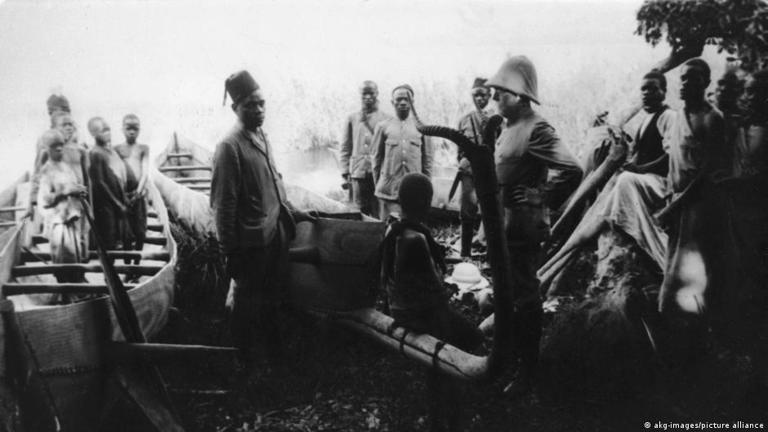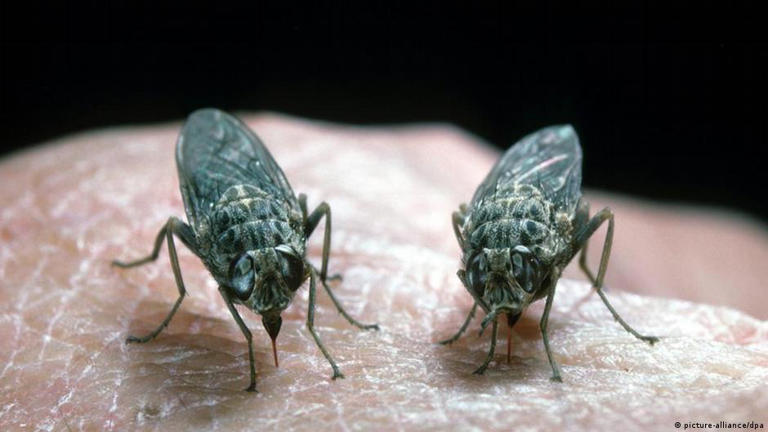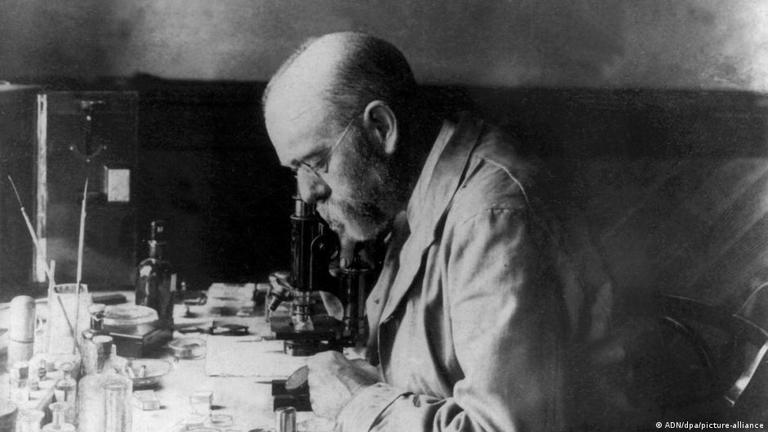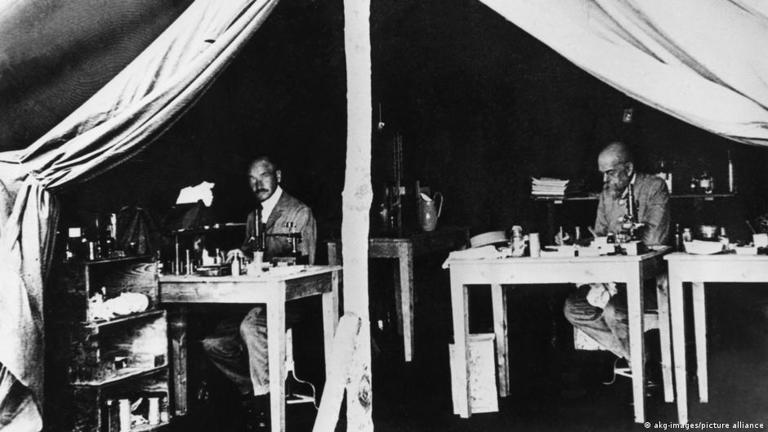Huwa kuna mijadala mingi mitandaoni kuhusu huduma za kinga na tiba tunazopewa na wazungu. Wapo wanaosema kuwa kuendelea kupewa misaada ya chanjo na baadhi ya tiba ni moja ya njia inayotumiwa na wazungu kupunguza kasi ya watu weusi kuzaliana. Nimefuatilia makala iliyorushwa na Dw inayoonesha ni kwa namna gani waafrika walifanywa kuwa panya wa majaribio na kupata madhara makubwa sana.
Fuatilia hapa chini:
• 4h • 4 min read
Health Topics mentioned in this article

In the early days of colonialism, many unsafe vaccinations were tested on African subjects without their knowledge or consent. This unaddressed trauma may explain vaccine hesitancy to this day.
 Robert Koch, in the helmet on the right, was already a famous scientist when he arrived in East Africa looking for a cure for sleeping sickness© akg-images/picture alliance
Robert Koch, in the helmet on the right, was already a famous scientist when he arrived in East Africa looking for a cure for sleeping sickness© akg-images/picture alliance
But African people were also being exposed to new diseases after meeting Europeans, like smallpox. When it came to treating these plagues, German colonial doctors saw opportunities to try untested treatments and medicines. At the same time, authorities wanted to minimize losses to colonial labor forces needed for building the colonies.

Tsetse flies are the carriers of sleeping sickness© picture-alliance/dpa
In 1906, sleeping sickness swept the Great Lakes region in East Africa. It affects both cattle and humans, locals and colonial officers. It's transmitted the tsetse fly, but no one knows how to stop it. The disease killed over 250,000 people at the turn of the century and affected most families in the region.
Despite being competing colonial powers, Britain and Germany were worried a lack of labor would threaten large-scale infrastructure projects.
Koch was sent to East Africa to do what he must to find a cure.
 Koch's discoveries in combatting tuberculosis established him as a groundbreaking scientist© ADN/dpa/picture-alliance
Koch's discoveries in combatting tuberculosis established him as a groundbreaking scientist© ADN/dpa/picture-alliance
Koch set up camp on the Sese Islands on Lake Victoria. Many cases were recorded there, but Koch needed more patients suffering from sleeping sickness. And he got them, in droves, but it is suspected many were taken by force.
Conditions in this camp were bad, and Koch began injecting patients with an arsenic-containing drug, called Atoxyl. When it didn't work, Koch raised the dose. Patients suffered intense pain, blindness — and every 10th person died.
Even after he returned to Germany in 1907, Robert Koch continued to recommend Atoxyl to treat sleeping sickness. As did colonial authorities, who set up further camps in East Africa, Cameroon and Togo.

Rober Koch, right, had traveled previously to South Africa to study the Rinderpest plague, and also worked for other governments, in this case the British© akg-images/picture alliance
This human experimentation was not allowed in Europe. But the racist nature of colonial policy regarded African people as expendable.
Koch's experiments on the Sese Islands were far from an anomaly in the colonial era. The well-being of the patients was not a priority — rather the effectiveness of certain drugs.
Medicine developed by colonial powers has saved countless lives in Africa. But their development came at a time of cross inequality, where abuse of African subjects was rampant. The traumas around human experimentation cast a long shadow over trust in Western medicine that is yet to be fully acknowledged.
Shadows of German Colonialism is produced by DW, Germany's international broadcaster, with funding from the German Foreign Ministry (AA). Consulting was provided by Lily Mafela, Kwame Osei Kwarteng and Reginald Kirey.
Edited by: Keith Walker
Author: Cai Nebe
Fuatilia hapa chini:
How distrust in Western vaccines was born during colonialism
Story by Cai Nebe• 4h • 4 min read
Health Topics mentioned in this article
In the early days of colonialism, many unsafe vaccinations were tested on African subjects without their knowledge or consent. This unaddressed trauma may explain vaccine hesitancy to this day.

Why was Germany interested in developing medical cures in the colonies?
During 1870s and 1880s, European nations scrambled to acquire territories across Africa. The imperialists knew that to control territories, you needed a presence. But diseases, like malaria, decimated Europeans in fledgling colonies in Cameroon and Togo so much that very few managed to settle beyond the coasts.But African people were also being exposed to new diseases after meeting Europeans, like smallpox. When it came to treating these plagues, German colonial doctors saw opportunities to try untested treatments and medicines. At the same time, authorities wanted to minimize losses to colonial labor forces needed for building the colonies.
Smallpox in Togoland
Effective smallpox vaccines were available in Europe by the 1880s. A smallpox epidemic in Togoland caused entire villages in the Lome region to succumb to the disease in the early 1900s. Colonial doctors responded by administering expired of ineffective vaccines. Even when it became clear that the vaccination campaign was not working, colonial subjects were forced to accept the vaccines, often by force. In 1911, colonial doctors finally stopped, investigated and changed their vaccination process. By 1914, the threat of smallpox was severely reduced. But the damage had been done.What was Robert Koch's role in colonial medicine?
Dr. Robert Koch was a Nobel Prize-winning scientist, who had made crucial discoveries in fighting deadly diseases like tuberculosis, anthrax and cholera. Many call him the father of microbiology. Over the next century, medical advances based on his research have saved millions worldwide. But there is a much darker side to Koch's contributions.
Tsetse flies are the carriers of sleeping sickness© picture-alliance/dpa
In 1906, sleeping sickness swept the Great Lakes region in East Africa. It affects both cattle and humans, locals and colonial officers. It's transmitted the tsetse fly, but no one knows how to stop it. The disease killed over 250,000 people at the turn of the century and affected most families in the region.
Despite being competing colonial powers, Britain and Germany were worried a lack of labor would threaten large-scale infrastructure projects.
Koch was sent to East Africa to do what he must to find a cure.

Why were Koch's actions controversial?
He was armed with a selection of drugs given to him by a number of pharmaceutical companies, which had until that point only been tested on animals in European labs — if at all.Koch set up camp on the Sese Islands on Lake Victoria. Many cases were recorded there, but Koch needed more patients suffering from sleeping sickness. And he got them, in droves, but it is suspected many were taken by force.
Conditions in this camp were bad, and Koch began injecting patients with an arsenic-containing drug, called Atoxyl. When it didn't work, Koch raised the dose. Patients suffered intense pain, blindness — and every 10th person died.
Even after he returned to Germany in 1907, Robert Koch continued to recommend Atoxyl to treat sleeping sickness. As did colonial authorities, who set up further camps in East Africa, Cameroon and Togo.

Rober Koch, right, had traveled previously to South Africa to study the Rinderpest plague, and also worked for other governments, in this case the British© akg-images/picture alliance
Camps as a testing ground for cures
Robert Koch suggested the use of isolation camps, a version of which had been used by the British Army in South Africa during the Anglo-Boer War, to fight disease and isolate sick individuals from their families — and if there was no cure, keep victims isolated until their death. Koch even advocated the same approach for building camps in East Africa to test new drugs on patients.This human experimentation was not allowed in Europe. But the racist nature of colonial policy regarded African people as expendable.
Was a cure for sleeping sickness ever found?
Yes! In 1916, a drug called Bayer 205 or Germanin becomes available. In 1921, Koch's former assistant Friedrich Karl Kleine tests the drug on locals in northern Rhodesia, today's Zambia. The new medicine is and carries an almost 100% cure rate. Not Atoxyl was used.Koch's experiments on the Sese Islands were far from an anomaly in the colonial era. The well-being of the patients was not a priority — rather the effectiveness of certain drugs.
Medicine developed by colonial powers has saved countless lives in Africa. But their development came at a time of cross inequality, where abuse of African subjects was rampant. The traumas around human experimentation cast a long shadow over trust in Western medicine that is yet to be fully acknowledged.
Shadows of German Colonialism is produced by DW, Germany's international broadcaster, with funding from the German Foreign Ministry (AA). Consulting was provided by Lily Mafela, Kwame Osei Kwarteng and Reginald Kirey.
Edited by: Keith Walker
Author: Cai Nebe